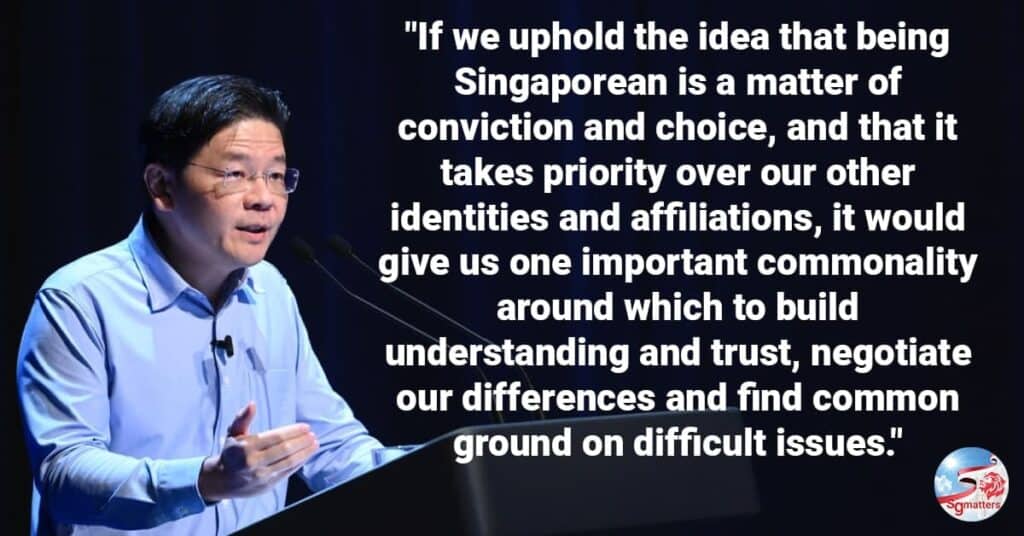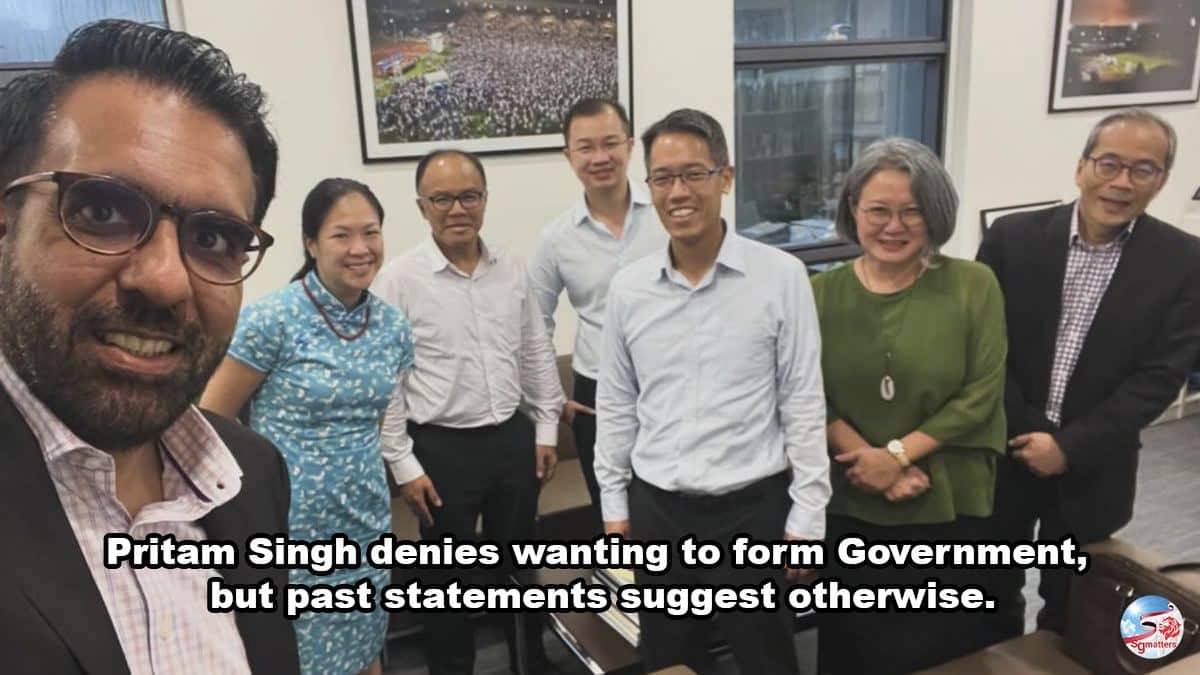How did people of different tribes live peacefully together in Singapore for more than half a century? Because generations of Singaporeans believed that what Singapore stood for as a nation exceeded the pull of their own tribal instincts and feelings, said Finance Minister Lawrence Wong.
This was not an instinctive choice. Nor was it a natural thing to do because tribalism runs deep in all human societies. It’s how nations had risen from tribes in ancient time.
Singapore is a racially very diverse society with our racial diversity surpassed by our religious diversity”: Muslims, Buddhists, Christians, Hindus, Taoists and many more.
But Singapore made the improbable choice to transcend our own tribal instincts and feelings.
““One people, regardless of race, language or religion” – that didn’t fall ready-made from the sky; we made it happen – despite the differences of race, language or religion,” said Mr Wong.
Our founding leaders took tough and necessary action. They invoked the Internal Security Act, introduced unpopular policies like the Ethnic Integration Programme for public housing to create more common spaces among the different racial and religious groups.

Emphasis on the culture of self
Speaking at the IPS-RSIS Conference on New Tribalism and Identity Politics on 23 November 2021, Mr Wong said that over the last few decades, there has been a greater emphasis on the culture of self. It’s all about how “I want to be free to be myself”.
Perils of Tribalism
But as New York Times’ columnist David Brooks has noted, when the sense of self is inflated, at the expense of community, individualism becomes the reigning ethos. When this happens, the connections between people get weakened. This leads to loneliness and isolation.
“And when people feel lonely and alienated, they fall back on defences that are perhaps primeval in our species – we revert to tribes,” said Mr Wong.
Internet and tribalism
The internet has made it easier for new tribes to form and organise themselves and the echo chamber of social media often means that these tribes end up self-selecting information to support and reinforce their own views.
Tribalism is not community
Tribalism may feel like community but it is not, said Mr Wong.
“Community is about inclusive connections, and it’s based on mutual affection. Tribalism is inherently exclusionary, and it’s based on mutual hate: ‘us’ versus ‘them’, “friend” vs ‘foe’.”
When tribal identity takes root, it becomes difficult to achieve any compromise because any compromise seems like dishonour, said Mr Wing.
“Every grievance threatens one’s self-worth; and every setback a challenge to one’s sense of self. So we get a downward spiral: individualism and self-interest cause tribes to form; each tribe close ranks upon itself; and politics becomes defined as all-out war among tribes.”

Identity politics in Singapore
This harmonious state of affairs in Singapore needs constant attention and careful management because it will always be on a knife-edge. The culture wars in the west have already created new forms of identity politics in Singapore and if we are not careful, they can easily take root here, Mr Wong said.
But managing these new tensions does not mean we have to pretend differences do not exist, he added.
Reason for pull of identity politics
Identity politics emerge when people face different lived realities.
“Different segments of our population will have their own real and valid concerns and anxieties,” Mr Wong said.
For example, women continue to bear a disproportionate share of housework and receive less recognition at work compared to their male counterpart. People with disabilities are not able to participate as fully in our society as they would like to. LGBTQ persons feel that society does not accept them – or even recognise them as different.
These are important concerns, Mr Wong said. One cannot say to any of these groups that their concerns are illegitimate or exaggerated, he added.
“If we are to live up to the founding ethos of Singapore, every Singaporean deserves a place in our society, regardless of his or her background, status or racial or cultural identity. This is what a fair and just society must mean.”
“The challenge is to acknowledge and do our best to address the legitimate concerns of every “tribe”, without allowing our politics to be based exclusively on identities or tribal allegiances.”
Our way forward
1. Tackle tribalism and identity politics
We do this by strengthening our human relationships, be good friends, good neighbours, good Samaritans. Such relationships will ultimately help to strengthen the trust we have in one another.
“Because when people lose faith in one another, things will fall apart very quickly,” Mr Wong said.
2. Avoid stereotyping groups of people or assuming that each community is monolithic or homogenous
The notion of ‘Chinese privilege’ is one such stereotype. A female Chinese from a poor background would have a vastly different lived experience compared to a male Chinese from a wealthy family.
We must avoid reducing our understanding of each other to a single dimension. No community is monolithic or homogenous. We must fight the instinct to set ourselves apart and pigeonhole others.
The reality is that all of us have multiple identities: racial and religious identities, and a variety of other identities. Being a Singaporean should never mean having to give up any of our other identities. But we are first and foremost Singaporeans.
‘If we uphold this idea – that being Singaporean is a matter of conviction and choice, and that it takes priority over our other identities and affiliations – that would give all of us one important commonality around which to build understanding and trust; to negotiate our differences and find common ground on difficult issues; and then we can continually look for ways to move forward together.”
” let us draw on the better angels of our nature,” said Mr Wong.
“We may not always arrive at a perfect solution. But we will never let any group feel unheard, ignored or excluded. We will never let any group feel boxed in or ostracised. All must feel that they are part of the Singapore conversation; all must feel they are part of the Singapore family; all must feel there is hope for the future.
“We must be careful not to allow these differences to become permanent divides that separate us. We must redouble our efforts to reach across our differences and strengthen our connections with one another .”
[irp posts=”8960″ name=”Singapore’s multiracialism preserves, protects and celebrates our diversity: Lawrence Wong”]
[irp posts=”7134″ name=”Don’t import culture wars or allow issues of gender identity to divide our society: Lawrence Wong”]
[irp posts=”8968″ name=”Full text of Lawrence Wong’s speech on race and racism”]





